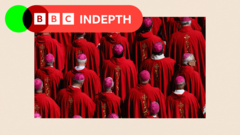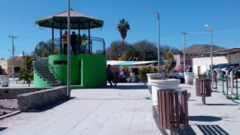As cardinals gather at the Vatican's Santa Marta guesthouse in the aftermath of Pope Francis's death, the atmosphere is charged with differing opinions on how to proceed following his papacy. With 133 cardinals eligible to vote, the conclave is poised to be one of the most diverse in history, presenting a mix of cultural backgrounds and church priorities.
Divisions Within the Vatican: A Closer Look Ahead of the Upcoming Conclave

Divisions Within the Vatican: A Closer Look Ahead of the Upcoming Conclave
The Vatican prepares for a pivotal conclave that could redefine the future of the Catholic Church.
The Santa Marta guesthouse's 128 rooms are almost fully occupied by cardinals convening to discuss the future of the Catholic Church ahead of a new papal election. One room, however, remains sealed— a somber reminder of Pope Francis, whose significant impacts on church policy and global issues continue to resonate. His leadership style centered around engaging with marginalized communities and breaking away from traditional hierarchical structures leaves both supporters and critics pondering the way forward.
In recent days, preliminary meetings among the cardinals have highlighted the diverse needs of the Church across varying global contexts. For the first time, representatives from nations like South Sudan, Cape Verde, and Papua New Guinea will add their voices to the conclave discussions. Regions such as Europe are primarily focused on revitalizing congregational engagement, while areas in Africa and Asia emphasize the urgent social issues of poverty and conflict resolution.
As they prepare for the conclave, cardinals are weighing candidates who recognize these differences and can manage the Catholic Church's complex administrative and spiritual roles. Cardinal Vincent Nichols notes the pope's role extends beyond the spiritual to include that of a global statesman, compelling the future pope to navigate the intricacies of social advocacy on behalf of the marginalized.
However, as discussions unfold, there remains an element of ambiguity around the vision Pope Francis tried to instill— namely, increased lay participation and a broader institutional response to critical social issues. Many cardinals feel a pressing need for clarity regarding the Church's future direction, especially on issues like gender inclusivity and LGBT+ acceptance, despite ongoing concern from traditionalists regarding perceived departures from doctrine.
In the weeks leading up to this conclave, both proponents and detractors of Pope Francis have voiced their views, creating a tension marked by an eagerness for both continuity and negotiation. As cardinals enter the Sistine Chapel for the sacred voting ritual, the influence of the Holy Spirit will also be a guiding principle, directing them to choose a leader who embodies a unified vision for the Catholic Church's future.
In recent days, preliminary meetings among the cardinals have highlighted the diverse needs of the Church across varying global contexts. For the first time, representatives from nations like South Sudan, Cape Verde, and Papua New Guinea will add their voices to the conclave discussions. Regions such as Europe are primarily focused on revitalizing congregational engagement, while areas in Africa and Asia emphasize the urgent social issues of poverty and conflict resolution.
As they prepare for the conclave, cardinals are weighing candidates who recognize these differences and can manage the Catholic Church's complex administrative and spiritual roles. Cardinal Vincent Nichols notes the pope's role extends beyond the spiritual to include that of a global statesman, compelling the future pope to navigate the intricacies of social advocacy on behalf of the marginalized.
However, as discussions unfold, there remains an element of ambiguity around the vision Pope Francis tried to instill— namely, increased lay participation and a broader institutional response to critical social issues. Many cardinals feel a pressing need for clarity regarding the Church's future direction, especially on issues like gender inclusivity and LGBT+ acceptance, despite ongoing concern from traditionalists regarding perceived departures from doctrine.
In the weeks leading up to this conclave, both proponents and detractors of Pope Francis have voiced their views, creating a tension marked by an eagerness for both continuity and negotiation. As cardinals enter the Sistine Chapel for the sacred voting ritual, the influence of the Holy Spirit will also be a guiding principle, directing them to choose a leader who embodies a unified vision for the Catholic Church's future.




















